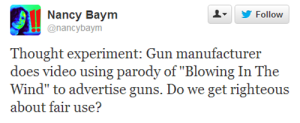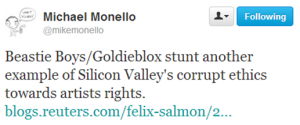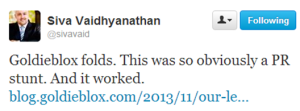Last night, on a “family show,” families everywhere learned that when a woman says repeatedly over the course of several months that she is not interested in a man, she doesn’t really mean it. They learned that when said man, after the first indication of disinterest, continues to make comments about how he would like to be with said woman, that’s not only acceptable, but going to be rewarded in the end. The audience was told that even if a woman has acted like she couldn’t stand a man for months and months, if he makes some grand gesture for her she will (should?) acquire romantic feelings for him.
I thought Once Upon a Time and I were on the same page. Strong Female Lead™ Emma Swan told Captain Hook that she had only kissed him as a “one time thing” to thank him for saving her father’s life (which was problematic from the get-go, but I’ll leave it there). She looked at him with disdain when he attempted to put his hand on her back as they left a room together. She explicitly said he was not someone she would “actually kiss” when the villain cursed his lips to try to hurt her. Everything about that said to me that she was in fact not interested in this guy.
Looking at the candidate for love interest himself, just in the last episode alone, Hook directly described what he has been doing as “chasing this woman.” When Emma complained about wearing a corset, he said “Your discomfort is a cross I’m willing to bear,” and then leered at her. Also, a past version of him noted, “If I didn’t know any better, I’d say you were trying to get me drunk, which is usually my tactic.” Previously, Hook implied that Emma wanted to leave town not because she had another life she liked but because she was afraid to love him, despite all the evidence in the previous paragraph. I thought this was supposed to be creepy. I mean, it was creepy, but I thought it was on purpose and that they knew it was creepy.
(There are many other examples for both, but these are the ones I have offhand and I can’t stomach going looking for more.)
But alas, when we get to the season finale, all of Emma’s “no”-s over the course of an entire season turn into a “yes.” She spends the whole episode flirting with him, at complete odds to her previous behavior, and then they make out.
There are a couple of ways to interpret this. One is that, while her words were saying “no” over and over again, what she meant the whole time was “yes”—and indeed, there were a few moments where they made the acting choice to have her eyes flicking to his lips when they were speaking and other similar instances as a subtext under the maintext of “no.” Under this model, “no” really does mean “yes,” and Hook was not obligated to take that explicit verbal disinterest as “no” and in fact ultimately justified in doing so. (Version A)
Alternately, it could be because, while Emma did really mean “no” at the time, she changed her mind. This could be because he wore her down (Version B). It could be because she was moved by his sacrifice of his beloved ship (the Jolly Roger) and thought that, much like when he saved her father, it deserved a reward (Version C). It could be because she thought that if he gave something up for her she should give something up to him (Version D).
Versions A and B are Rape Culture. Versions C and D are The Traffic in Women. Let’s talk about each.
Rape Culture, as a conceptual apparatus, describes the ways in which contemporary sexual and gender politics are organized around a belief in men’s inherent right to access to women’s bodies. (This isn’t to say only men can rape or only women get raped [nor indeed that there are only two categories], but as a system of power it’s gendered in that way.) This is the stuff of street harassment (I have a right to look at you and comment on you and a right to a response from you). It’s the logic by which women who dress revealingly or flirt or make out with someone are “teases” if they don’t then “follow through” on what the man is “owed” by their implicit contract.
Rape culture is a very old problem, but where many forms of gender inequality have diminished over time, this one has gotten reinvigorated by some recent popular media. We see it in Twilight, where Edward behaving in stalker-y ways toward Bella is framed as romantic. (Probably the best line from the famous Buffy vs. Edward mash-up: “You know, being stalked isn’t really a big turn-on for girls.”) We also see it in Blurred Lines, the lyrics of which have brilliantly been paralleled to the statements of rapists. The song’s narrator just “knows” the “good girl” “wants it.” Well golly, that should be good enough for anyone . . .
So while Emma said “no,” she really meant “yes,” or she changed her mind because he was persistent. Hook’s assertion of a right to her body was ultimately legitimated. That’s rape culture.
With calling Versions C and D The Traffic in Women, I’m thinking of the Gayle Rubin version, not the Emma Goldman version, which I have not read. The key part of the traffic in women for our purposes is that it is a cultural and economic system whereby women are commodities to be sold by men. It used to be that your parents sold you to a husband (or paid a husband to take you), and as a result you became his property (Fairly literally. Married women didn’t exist as separate legal people). And as his property you had to do what he wanted (I won’t start on Once’s record on forcible marriage, though I think I will be back next week to write Once Upon a Misogyny (with a Side of Racism) for how they treat the character Regina).
This is, again, an old problem, but, also again, one that persists. The notion that if a man spends a lot of money on a woman she’s obligated to have sex with him is one instantiation of it. So is the comment at the center of a recent controversy that “compares a man’s obligation to go to work, regardless of his ‘mood,’ to a woman’s obligation to have sex with her husband” (The comment is old, and not as linked to Kentucky Senator Mitch McConnell as it was described to be, but it’s still pretty appalling and a clear version of this logic).
So when Hook gave up his ship for Emma, he bought her fair and square. She owed him something, either consciously as in Version C or more as the result of cultural conditioning as in Version D. Actual quote: “You traded your ship for me?”
And this episode was described by the show’s Executive Producers as “epic wish fulfillment.” It begs the question: Whose wishes? It certainly doesn’t fulfill the wishes of people who were drawn into this show by its strong female leads (Emma and bandit Snow White and the Season 1 villain Regina), because the glorification of rape culture and women as purchasable is incompatible with strong female leads. Does it fulfill the wishes of the Twilight generation (and their moms), who found Edward’s stalking and the Edward-Jacob ownership battle oh-so-romantic? Perhaps. Does it fulfill the wishes of men who have been trained to see women as something to which they have an inalienable right? Absolutely.
This is profoundly disappointing, particularly from a show that was premised on rethinking fairytales. This isn’t rethinking. It’s more of the same old patriarchy, and its 2014.



